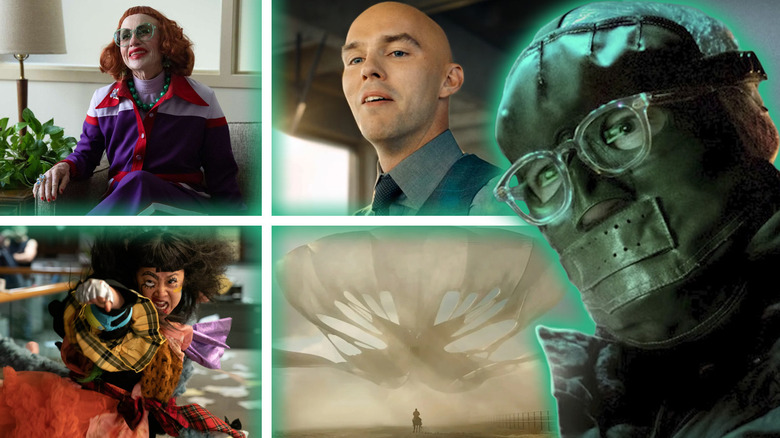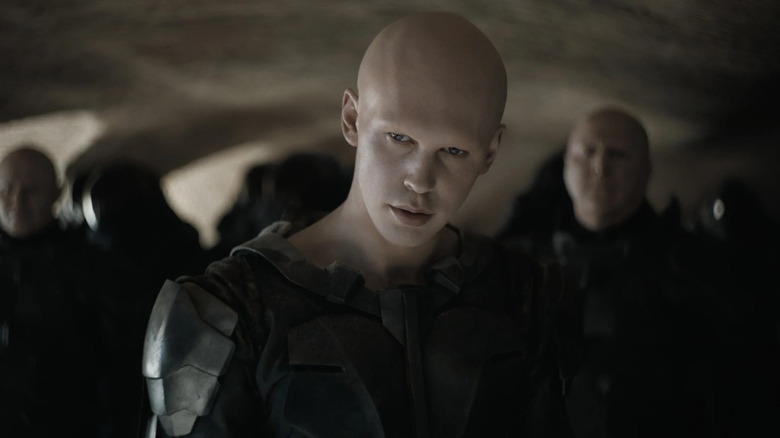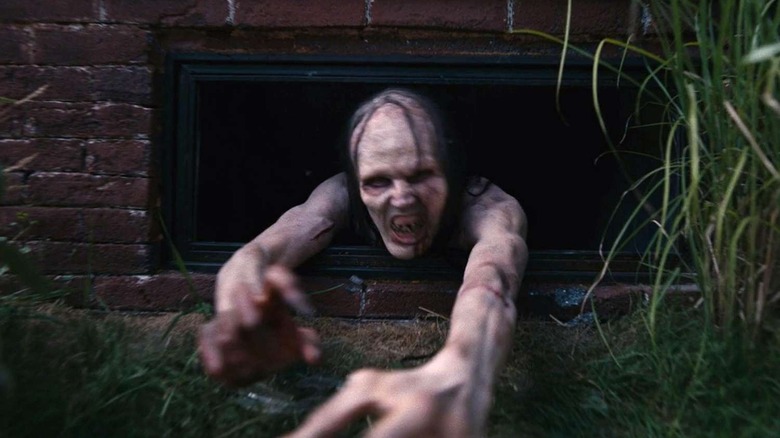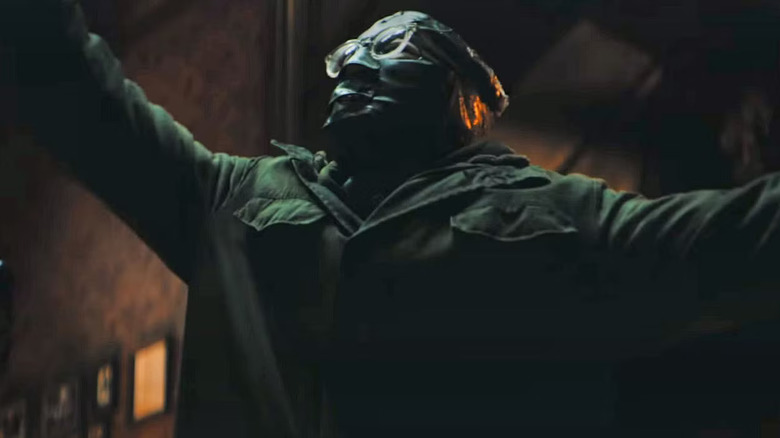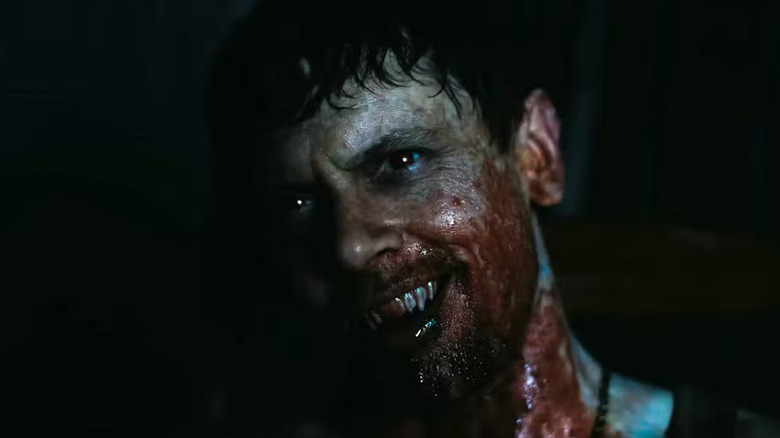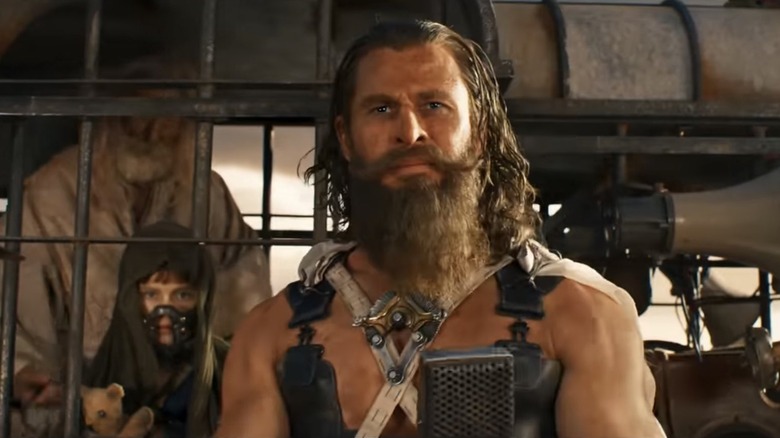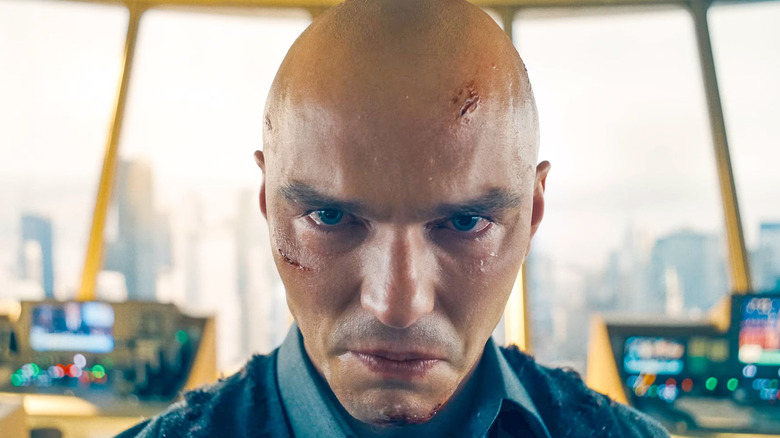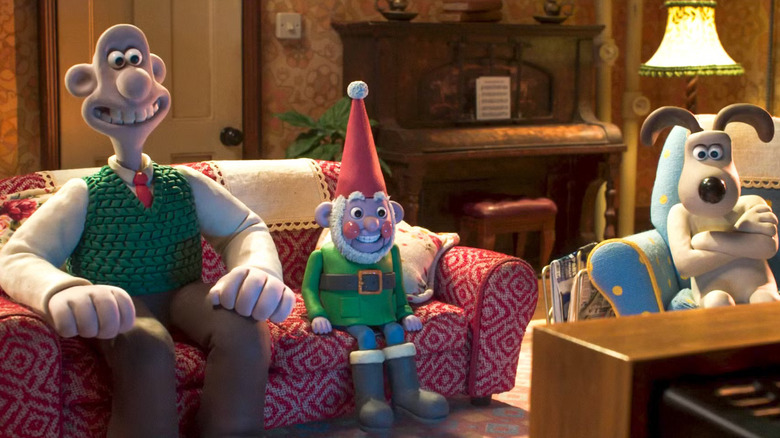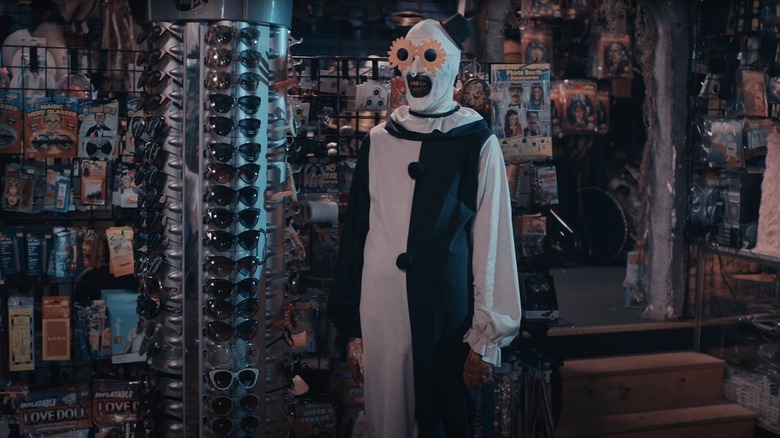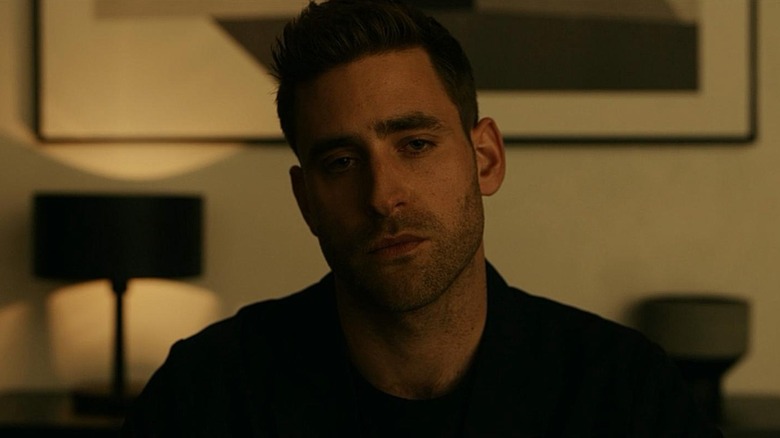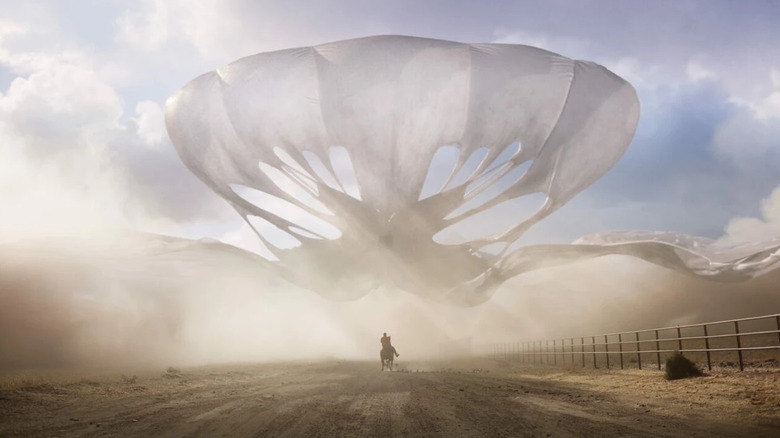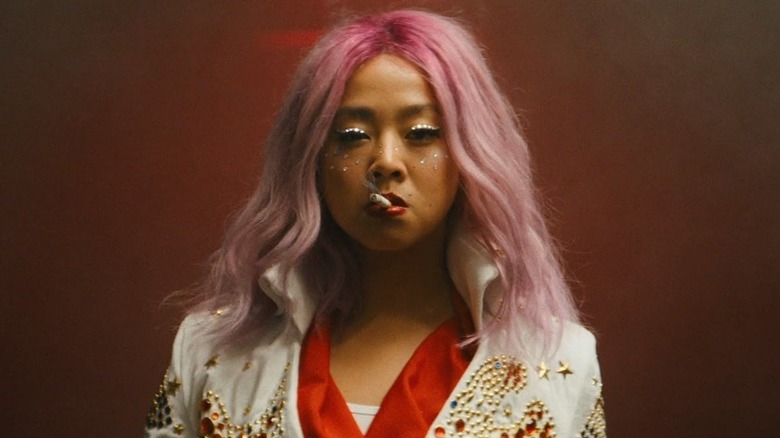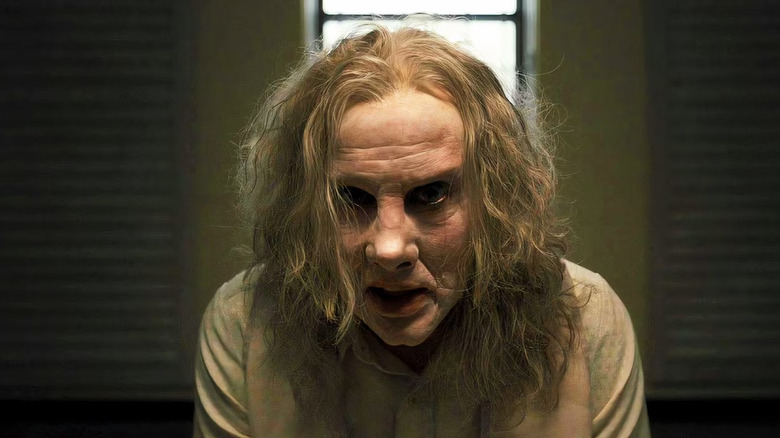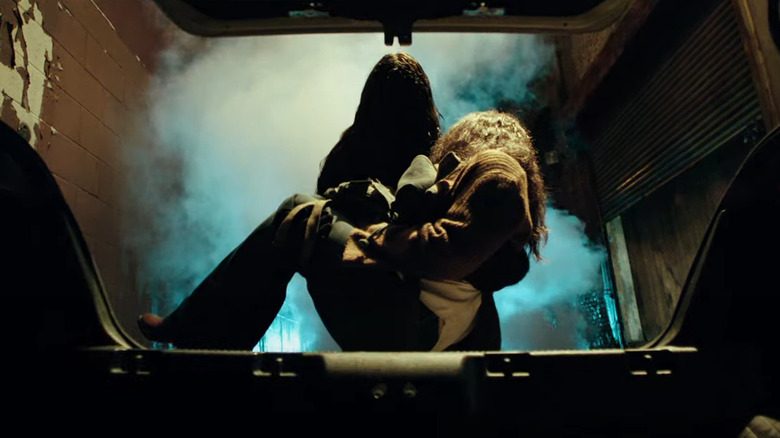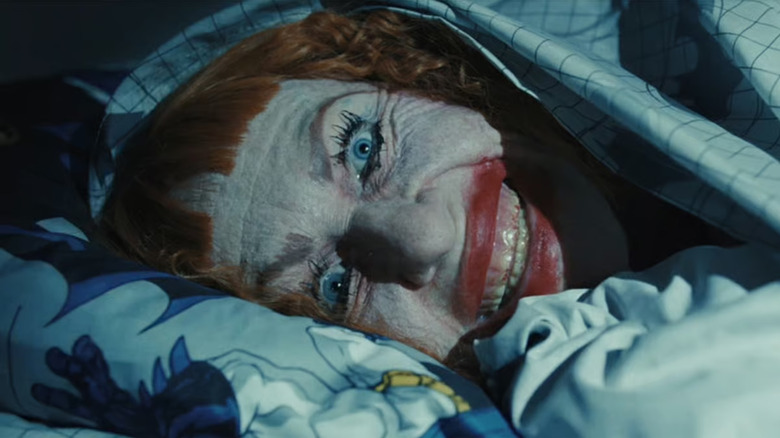15 Best Movie Villains Of The 2020s (So Far)
Crafting an engaging movie villain can be a work of careful finesse. Whether it's balancing characters' innate human pathos with terrible actions, or weighing their irredeemable vileness with how much justice they'll receive on behalf of the audience, most villains need some kind of recognizable core of emotion that audiences can recognize and react to appropriately. The best villains always find a way to make an impression within their specific context: action/sci-fi thrillers, slashers, and animated comedies can often call for different flavors of antagonists, and should be judged accordingly.
In a time of immense social and political polarization, where incompatible worldviews define party lines, more and more people are increasingly seeing the world split between a divide of heroes and villains. In crafting this list, I noticed an outsized portion of the characters are purely bad people with little to no redeeming qualities — evil is evil, and that's that. It's a timely theme for a world in which terrible people seem to gleefully, spitefully rampage over ideas of civility, justice, and empathy. Maybe there is no redemption.
In no particular order, here are 15 of the best movie villains of the 2020s (so far).
Feyd-Rautha Harkonnen (Dune: Part Two)
Adapting "Dune" was already a challenge for writer/director Denis Villeneuve. Between its byzantine backlog of lore and heady, political, hard sci-fi, it got to the point where Villeneuve was inventing his own rules for some of his adaptations. And then you get to "Dune: Part Two," where he has to introduce Feyd-Rautha Harkonnen (Austin Butler), an exceedingly strange villain in an already exceedingly strange story.
And yet, Villeneuve and Butler bring Feyd-Rautha to life with rich detail and perturbing menace, with his marble-white skin and bald head pursuing Paul Atreides (Timothée Chalamet) and his freedom fighters across Arrakis in the name of Harkonnen rule. It's an ominous performance from Butler, who imbues this disconnected but ruthless persona with cold calculation and brutal ferocity. He's given the stand-out sequence of the movie: a full-blown gladiator battle on the monochromatic world of Giedi Prime, presenting a stark contrast to the vivid sands of Arrakis. He also kisses his uncle Baron Harkonnen (Stellan Skarsgård) on the mouth at one point. Weird!
The Mother (Barbarian)
A big reason Zach Cregger's "Barbarian" is so great is that it obfuscates its real villain for so much of the movie. The opening act would lead you to believe that it's going to be Bill Skarsgård, who Georgina Campbell has an awkward and potentially ominous encounter with after seemingly both being booked for the same AirBNB. All the marketing revolves around a dank, creepy old torture basement in this house ... surely he's taking her down there to do horrible horror movie villain stuff that she'll have to escape from, right?
Nope! As soon as they go exploring those grungy, dark tunnels carved out beneath the house, Skarsgård is taken out by the film's real villain, The Mother (Matthew Patrick Davis), a contorted and deformed woman living within, desperate for a child to call her own. Surely this is the only movie villain I can recall in recent memory that force-breastfeeds Justin Long, perfectly cast as the weaselly, scumbag rental landlord. This is a standout horror feature for the 2020s because of how it subverts your expectations, but we have a list of 15 more movies like "Barbarian" if you want more like it, though they're all severely lacking any mommy stuff.
The Riddler (The Batman)
A property much more historically entrenched in the public consciousness than "Dune" was given an adaptation that tried to reflect some of the source material's comic book peculiarity when Matt Reeves made "The Batman." Running just about three hours and introducing audiences to a goth-mode interpretation of Bruce Wayne via Robert Pattinson (I approve of emo Batman), we're also reintroduced to a slew of familiar villains. Even though Colin Farrell's Penguin is the one who got the TV show, it's Paul Dano's Riddler who sticks out with his slimy enmity.
Fitting for a Batman movie that basically drops the character into the world of "Se7en," Dano's Riddler is a far cry from Jim Carrey's more heightened and theatrical interpretation in "Batman Forever." Dano embraces the wretched malice of his on-screen persona as established in movies like "There Will Be Blood" and "Prisoners" to craft a more recognizable deranged Riddler — one who mobilizes an online cohort of followers into a violent mob of insurrectionists against Gotham City. No parallels to reality to speak of here!
Remmick (Sinners)
The villain of "Sinners," Ryan Coogler's cocktail of Jim Crow-era Southern mobster drama, rip-roaring vampire action, and show-stopping musical numbers, is Remmick (Jack O'Connell), an Irish folk-tune singing bloodsucker who perpetuates a cycle of oppression by invading Black cultural space established by Smoke and Stack Moore (both played by Michael B. Jordan). He encompasses the film's precise harmonizing between its two modes: pulpy horror fiction, and historical dissection of societal ills.
Indeed, with "Sinners," Coogler finds himself evolving Jordan Peele's very specific horror mission of socially conscious thematic underpinnings that anchor heightened concepts to reality. Remmick is the idea personified: He's swaggering and boastful, pitiless in his mission and capability for bloodshed, an emblem for how smoothly the cycle can turn for the oppressor to become the oppressed ... and he also leads his army of vampires in a jangly stomp-clap Irish ditty between moments of carnage. "Sinners" is one of the most distinct blockbuster hits audiences have latched onto in years, and a character like Remmick proves that thematically rich, curiously detailed characters help create that engrossing quality.
Dementus (Furiosa: A Mad Max Saga)
"Furiosa: A Mad Max Saga" has its detractors — turns out it's hard to satisfy everyone when you're making a prequel to what is often cited as one of the greatest action movies of all time, even for George Miller himself. Indeed, "Mad Max: Fury Road" set a new precedent for spectacular action filmmaking, but "Furiosa" adds another laudable notch to Miller's belt with a years-spanning odyssey across the Wasteland that takes a great interest in the emotional terrain of its title character and adds further weight to her journey in "Fury Road."
Furiosa's (Anya Taylor-Joy) formative experiences largely hinge on her struggles against Dementus (Chris Hemsworth), the leader of the Biker Horde who voyages around terrorizing the Wasteland with his crew of metal-riding lunatics. A true son of the Wasteland, Dementus is mostly deranged and psychotic, which gives Chris Hemsworth a perfect opportunity to break out of the years-long Marvel box in which he'd been placed and allowed him to step into a role which lets him be much more uninhibited and ungoverned by any virtues of heroism. Dementus is mostly a weird, child-kidnapping, murderous freak, which makes him a great addition to Miller's ever-expanding "Mad Max" mythos.
Lex Luthor (Superman)
Lex Luthor may not be all that unique as a character to the 2020s, but Nicholas Hoult's portrayal of him in "Superman," James Gunn's rejuvenating reboot of the franchise, feels remarkably pertinent to our cultural and political moment. As a mega-rich tech magnate hellbent on enacting his will and sphere of influence on the world around him (which means scapegoating a being he perceives as a threat to this power due to Superman's benevolence and diverse origins), the Lex Luthor of 2025's "Superman" is a villain for the modern world.
It's that type of rendition that gives "Superman" the balance of sadness and hope that makes it such a breath of fresh air for the character, and for the state of superhero movies at large. It's refreshing to not only have a crackling, genuinely fun, and inventive comic book movie again, but one that has such a clear-sighted perception of the world it's been released into. Lex helps embody that careful footing between those two realities, with Hoult affording him an over-the-top bravado and petulance that acts as a dark caricature of the peevish tycoons that have come to forcibly intercede in our everyday lives.
Norbot (Wallace & Gromit: Vengeance Most Fowl)
Speaking of culturally relevant villains, it's only fitting for the small-town English goofball inventors of Wallace and Gromit to find themselves face-to-face with an AI bot threatening the fabric of their friendship. That would be Norbot (Reece Shearsmith), an automated "smart" version of a garden gnome invented by Wallace (Ben Whitehead) that is duly hacked by the pair's old nemesis, Feathers McGraw, to gaslight and terrorize Gromit.
There's a reason "Wallace & Gromit: Vengeance Most Fowl" hit a 100% Rotten Tomatoes score: It's gleefully silly and funny, and zanily speaks to the existential anxiety of AI technology encroaching into our daily lives. Norbot himself is representative of this, of course, but so is the very existence of "Wallace & Gromit" as a whole. Is there any greater rebuke toward the dearth of true creativity inherent to the automated mimicry of AI than the painstaking, exacting process of assembling a stop-motion animated film?
Art the Clown (Terrifier)
Love or hate the "Terrifier" films (or take the thinking man's position like me and say "they're fine"), it feels like Art the Clown (David Howard Thornton) is owed a place on this list for being a brand new slasher villain that managed to break into the general zeitgeist. No, he may not be on the level of a Michael Myers or a Jason Voorhees within the collective consciousness (yet), but the "Terrifier" movies have genuine cult status, and you can easily find plenty of Art paraphernalia at your local Spirit Halloween every year.
There's also something to be said for the broader horror fandom's embrace of Art's vicious, sadistic antics, and that of Damien Leone's trilogy (so far) as a whole. The "Terrifier" movies could be a tough sell to mainstream audiences: They're slasher films that revel in pushing the boundaries of gore and good taste as opposed to building atmosphere and allowing the kills to punctuate a broader vibe. The vibe in "Terrifier" is inextricable from the excessively brutal kills, and it seems indicative of a cultural and socio-political era that feels just as savage in nature.
Adrian Griffin (The Invisible Man)
Adrian Griffin (Oliver Jackson-Cohen) makes it onto this list because of how unexpectedly effective Leigh Whannell's modernized edition of "The Invisible Man" ended up being. Jackson-Cohen inhabits Adrian's abusive, gaslighting partner of Cecilia Kass (Elisabeth Moss) with a sneering, smug sense of entitlement in being able to own and control his significant other. Which is why, when she tries to leave him, he puts his top-secret science experiment to work: a tricky optical illusion suit that allows him to be invisible. Then he goes even further and tortures Cecilia by making everyone around her believe she's insane.
Adrian is such a great villain because of how genuinely enraging it can be to watch him get one over on Cecilia by leaving her stuck with a support network that believes she's experiencing some kind of heightened sense of trauma instead of being stalked and brutalized by her invisible ex. It's what makes "The Invisible Man" such a scary, timely horror update: Whannell mines the scenario for all the genuine tension and frights he can achieve, but there's a greater sense of recognition of how our society frequently diminishes and disbelieves the stories of hurt women.
Jean Jacket (Nope)
There are a few villains in Jordan Peele's pop sci-fi thriller blockbuster "Nope" who all exist with varying degrees of sympathy: Gordy, the rampaging but exploited primate; Ricky "Jupe" Park (Steven Yeun), the witness to Gordy's frenzy; and then the film's main attraction, an alien entity named Jean Jacket by brother-sister duo OJ (Daniel Kaluuya) and Emerald Haywood (Keke Palmer). When they spot the UFO, they become obsessed with capturing it on camera, acting as the authors of an important cultural statement and looking to profit from it.
"Nope" tackles a bevy of interconnected and heady themes, from the collective labor it takes to capture true spectacle, to the fact that so often the spectacle in question is a person or creature that's being leveraged to sustain capitalistic success. "Nope" is a thriller spectacle largely about the horrors of exploitation, and Jean Jacket is a great villain because of its mystery, its terror (that digestion scene!), and an inherent empathy that the movie asks us to extend to all of its troubled creations, like Gordy and Jupe. "Nope" is brilliantly written in that the circumstances and actions of every character can be traced back to the thematic notion of how we act in industries that encourage such exploitation, and Jean Jacket is a perfect, single distillation of the idea.
Jobu Tupaki (Everything Everywhere All At Once)
The fact that "Everything Everywhere All At Once" won Best Picture at the Oscars still occasionally crosses and boggles my mind. There was never any good reason to predict that this overloaded, hyperactive, shamelessly sentimental sci-fi action comedy family drama would have such a successful awards run, but Daniel Scheinert and Daniel Kwan disproved the narrative of the Best Picture winner needing to be a predictable choice.
How else would a movie with a villain named Jobu Tupaki (Stephanie Hsu) — the fractured multiverse persona of the disaffected daughter of an immigrant family, Joy Wang, who wields divine supernatural powers that are concentrated in an "everything bagel" that holds the fabric of the world's existence within its crumbs, ready to be destroyed at any moment — be able to carry an awards-season narrative all the way to the end of the line? And even then, Jobu Tupaki is just one layer to the many manic concepts that supercharge the raucous chaos and kindness of "Everything Everywhere All At Once," which confronts the turmoil and confusion of the world with a compassionate plea for understanding and empathy.
Longlegs (Longlegs)
Much of Neon's marketing for "Longlegs" focused on obscuring Nicolas Cage's titular serial killer via ambiguous perspectives and quick cutting, dotting trailers that played up audience reactions, essentially calling "Longlegs" the new scariest movie of all time. That's an unfair distinction for "Longlegs" to attempt to live up to, and the movie itself seems to undermine these suggestions as Longlegs himself is gradually presented as an eerie but submissive pawn of Satan.
But that's a fascinating direction to plot out for the central antagonist of your horror-procedural movie, and Cage perfectly inhabits the all-important role that helps make Oz Perkins' movie sing its strange tune. Perkins is deliberate in the deployment of the villain; Longlegs isn't actually in "Longlegs" for all that much screentime, but his presence, and even more so the implication of what his actions entail, settles like a heavy fog across the rest of the movie, giving events an ominous mystery that can be traced directly back to Cage's omnipresence.
Gabriel (Malignant)
Talk about a villain that the marketing decided to obscure! Spoilers for "Malignant" ahead, as there's no way to talk about what's so great about the film's antagonist without going into detail — even mentioning him is a give-away, as he's not given away in any promotional material. Gabriel is a great character not only because of the beautiful, disgusting practical gore effects on display to help create him, but because of the rug-pull of his very existence, living on the back of protagonist Madison Mitchell's (Annabelle Wallis) head as a once-dormant, underdeveloped fraternal twin who is now back to retaliate against the cruel world that discarded him. When he arrives, "Malignant" transitions from spooky studio haunted house movie into exploitation mayhem.
Again, that's all while living on the back of Madison, allowing "Malignant" to get into some absolutely bonkers action set-pieces that are given an extra dose of heightened insanity by Gabriel controlling his body in reverse. As James Wan's welcome return to horror, "Malignant" is a knock out of the park, and it gave audiences a genuinely unique new horror icon born out of a wondrously haywire concept.
Gladys (Weapons)
Good on Zach Cregger for crafting two movie villains notable enough to make it onto this list. You likely know about "Weapons" by now, Cregger's first real, true-blue breakout success following the more cult-based fandom of "Barbarian." Therefore, there's a good chance you know about Gladys (Amy Madigan), the sinister occult enchantress who possesses people to will them to do her violent bidding, with a performance by Madigan that's tremendously celebrated by "Weapons" fans, praising her and trying to manifest a Best Supporting Actress nomination at the Academy Awards.
Time will tell if folks can bend Academy voters to their will and get talent from the likes of Cregger's horror-comedy hybrid up on that prestigious stage. But it should go without saying that Gladys stands on her own, even without recognition by an awards body, sustaining the peculiar tone and forward momentum of "Weapons" within a perfectly wicked villain.
Steven J. Lockjaw (One Battle After Another)
Following the discussion of Amy Madigan potentially making it to the Oscars, if there's one person for whom a Best Supporting Actor nomination seems pre-ordained, it's Sean Penn as Colonel Steven J. Lockjaw. Paul Thomas Anderson's weird, Thomas Pynchon-inspired confluence of political thriller and shaggy dog stoner odyssey comedy has been met with plenty of praise, with no one receiving more of that attention than Penn for his performance as the exceptionally fascistic, racist military man who walks like a misprogrammed cyborg, on the hunt for the remnants of the former revolutionary faction, the French 75.
We've already named Lockjaw the best movie villain of 2025, but there's a case to be made that he's the best movie villain of the decade so far. As much justified umbrage as there is to take with the actor himself, Penn as Lockjaw is the kind of performance that sends you buzzing out of the theater, startled to be reminded of what it looks like when an actor inhabits a role so unreservedly. In a masterpiece of a movie, Lockjaw is a marvel of a villain.
